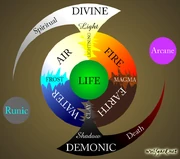The way the play portrays magic and wizards, or sorcerers, or whatever you'd call Prospero was very interesting. His powers seem limited - he needs his staff, his books, and possibly his "magic cloak" in order to do anything. Furthermore, when he DOES do something magical, it's through the use of a servant - usually Ariel. Ariel seems fairly powerful, able to turn into wind and fire, appear as a harpy, mimic voices, create sounds, etc. Prospero uses this to great effect, but it's still not really him doing it. The one thing Prospero does actually seem to be able to do, to which Caliban attests, is to give people cramps. Malicious, certainly, but not nearly as menacing as the baby-eating witches we've been studying.
I was a bit confused as to exactly what prompted Prospero to forgive Alonso and company of their misdeeds. It seemed to me, from both the text and the version of the play I watched, that the cause was Ariel saying that Gonzalo was crying into his beard. If that's the case, though, then Prospero's intricately-laid plans to bring them to the island alive, keeping the ship intact and all, don't make sense anymore. Eventually I decided it had been his plan all along to forgive Alonso. Then again, his blustering threats throughout the play suddenly don't carry much weight when he reveals his decision to renounce magic, which may just be the whole point. I think the reader/viewer ultimately has to decide that, which plays into the epilogue where he begs the audience for forgiveness.





